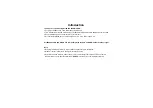
2-6
41-001343-01 Rev 02, Release 3.2.2
Aastra Web UI
An administrator can setup and configure the IP phone using the
Aastra Web UI
. The
Aastra
Web UI
supports Internet Explorer and Gecko engine-based browsers like Firefox, Mozilla or
Netscape.
HTTP/HTTPS Support
The Aastra Web UI supports both Hypertext Transfer Protocol (HTTP) and Hypertext Transfer
Protocol over Secure Socket Layer (HTTPS) client and server protocols.
HTTP is the set of rules for transferring files (text, graphic images, sound, video, and
other multimedia files) over the Internet. When you open your Web browser, you are
indirectly making use of HTTP. HTTP is an application protocol that runs on top of the
TCP/IP suite of protocols (the foundation protocols for the Internet).
HTTPS is a Web protocol that encrypts and decrypts user page requests as well as the pages that
are returned by the Web server. HTTPS uses Secure Socket Layer (SSL) or Transport Layer
Security (TLS) as a sublayer under its regular HTTP application layering.
SSL is a
commonly-used protocol for managing the security of a message transmission on the
Internet.
It uses a 40-bit key size for the RC4 stream encryption algorithm, which is considered
an adequate degree of encryption for commercial exchange. TLS is a protocol that ensures
privacy between communicating applications and their users on the Internet. When a server and
client communicate, TLS ensures that no third party may eavesdrop or tamper with any message.
TLS is the successor to SSL.
Note:
An Administrator can enable or disable the Aastra Web UI for a
single phone or all phones in a network. For more information about
enabling/disabling the Aastra Web UI, see
“Enabling/Disabling the
Aastra Web UI”
on
page 2-15
.
Note:
HTTPS uses port 443 instead of HTTP port 80 in its interactions
with the TCP/IP lower layer. Both the HTTP and HTTPS port numbers
are configurable using the configuration files, the IP Phone UI, the Aastra
Web UI and DHCP Option 66. For more information about configuring
these ports, see Chapter 4, the section,
“Configuring the Configuration
Server Protocol”
on
page 4-104
.
















































